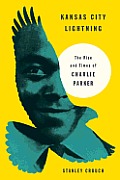 Kansas City Lightning not only takes us inside Charlie Parker’s life, but into the world of jazz, circa 1930’s and 40’s. Stanley Crouch’s ending is a surprise because he stops in the middle, just as Parker is hitting it big in NYC. At first I felt a little cheated. Hey, this is only half a bio. Then I realized I knew all I really needed to know if I were looking to find out about about Bird, the musician and the man. The rest is more of the same. The same what? Check it out.
Kansas City Lightning not only takes us inside Charlie Parker’s life, but into the world of jazz, circa 1930’s and 40’s. Stanley Crouch’s ending is a surprise because he stops in the middle, just as Parker is hitting it big in NYC. At first I felt a little cheated. Hey, this is only half a bio. Then I realized I knew all I really needed to know if I were looking to find out about about Bird, the musician and the man. The rest is more of the same. The same what? Check it out.
Crouch opens the book as Charlie arrives in New York with the Jay McShann band for their booking at the Savoy. Their big chance. They’re hicks, these guys from Kansas City, trying to do battle with established Harlem bands in the cutthroat world of 1930-40 musical wars. Plenty before them had gone down, returning to KC with their stomachs empty and their tails between their legs. Crouch places this event in musical, historical, and racial context. Joe Louis, Louis Armstrong, Pearl Harbor are all important to how the Savoy got there and to what goes on inside. Sometimes it seems like he’s leaving Parker out of it. But he’s not. Just as the music always returns to the melody no matter how far the improvisation appears to wander, Crouch’s subject is always Bird, every moment.

From New York, we go to Kansas City and Charlie’s upbringing in a fatherless household by a doting mother. His tutelage under great musicians of his time both in the segregated school system and on the streets. We hear of his romance with first wife Rebecca (Beckerie) in her own words. “My eye fell on him . . . and I knew there was gonna be trouble. I knew I was in love with him.” And trouble there was. Clear as she was about what might lie ahead, she can’t help herself any more than Charlie can help shooting up his heroin. Parker is no kind of husband and father and really doesn’t want to be. He plays at it occasionally, but he brings Beckerie crabs, leaves love letters lying around, and even puts a pistol to her head. All Parker’s really good for is music, and sometimes he isn’t even good for that–missing gigs, pawning his sax for drugs, falling asleep on the bandstand. There are those who recognize his talent, but believe God made a mistake giving it to Bird–a little like Salieri’s attitude toward Mozart in Amadeus. But those folks are not God, and beneath all Parker’s apparent deficiencies is a drive toward perfection, toward creating with his horn what he hears in his head. He seeks out mentors–probably Buster Smith is the most prominent–who are educated in music, who can take him through the theory he needs in order to understand the mysteries of the scales and chords and other harmonic complexities necessary to give his improvisations the power he yearns for.
Day and night, often going with little or no sleep, Parker works his horn and his mind. Natural talent? You bet. But ultimately what he accomplished came as much from intense study and practice as talent. And all that made it impossible for him to fit into in everyday world. But on the bandstand? Different story, And unlike Gary Giddins in his bio of Louis Armstrong (Satchmo) Crouch never lets his feeling for his material get bogged down in technical jargon, though he doesn’t shy away from that either when necessary. Instead, he helps us feel the pulse.
With the Jay McShann Orchestra shouting behind him, Parker–a great ballroom dancer himself, whose high-arched feet force him to move from his heels–choreographs his improvised melodies through the saxophone. Feinting, running, pivoting, crooning, he is inspired by the dancers and inspires them in turn, instigating them to fresh steps.
And thus, in passage after passage, does this superb writer paint for all of us an intense portrait of the triumph and tragedy of the gift to the world that is Charlie Parker.
